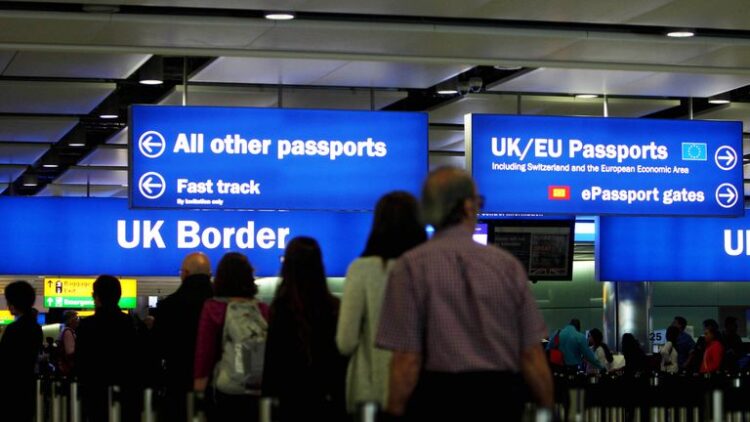By Ben Kerrigan-
Net migration in the Uk is the highest on record for the past year, after rising to 606,000 in the year to December 2022, according to official statistics .
It comes despite a Tory 2019 manifesto commitment to “bring overall numbers down”. The figure was 488,000 in 2021.
Net migration is the annual number of people arriving in the UK when both immigration and emigration are taken into account.
The figures, published by the Office for National Statistics (ONS) this morning, show that total long-term immigration was estimated at around 1.2 million in 2022, while emigration was 557,000.
Most people arriving in the UK last year were non-EU nationals (925,000), followed by EU (151,000) and British (88,000), the ONS said.
However, the ONS said that despite the rise in immigration last year, its long-term international migration estimates “suggest a slowing in growth over the most recent quarters”.
According to the ONS data, the non-EU arrivals included 361,000 students and their families, 235,000 people coming for work-related reasons, 172,000 coming on humanitarian schemes from countries including Ukraine, Hong Kong and Afghanistan, and 76,000 people claiming asylum.
Ministers have been braced for the net migration figure for several weeks, and have managed expectations by briefing to media organisations that the figure could be as much as 1 million.
The figure is more than double the level recorded in 2019, when the Conservative party pledged in its election manifesto to reduce immigration.
It is particularly embarrassing for the arch-Brexiters Rishi Sunak and Suella Braverman, who argued that leaving the EU would allow them to take control of UK borders.
The pre-Brexit average of net migration was between 200,000 and 250,000 a year. Braverman last year said she aimed to reduce overall migration to “tens of thousands” and Sunak has previously stuck to Boris Johnson’s 2019 pledge to bring down the overall figures to below 245,000. This week he has declined to give a specific target.
Sunak’s promise to reduce the asylum backlog this year has filed, with the number waiting for an initial decision went up to 172,758 from 166,261, Home Office statistics show. The number waiting more than six months has increased by about 10,000 to 128,812.
The number of foreign criminals and people refused asylum removed in 2022 was 38,000, the lowest number on record other than during the years of the pandemic, the Home Office figures showed.
Immigration, via regular routes such as visa schemes and irregular routes such as across the Channel in small boats, will be a significant political battleground at the general election expected next year.
Sunak this week claimed the government’s new crackdown on foreign students – barring them from bringing in dependants or switching to work visas before completing their studies, and also reviewing their maintenance requirements – was the “biggest ever single measure” to tackle legal immigration.
However, the ONS said evidence showed that overseas students tended to leave once they finished their courses. “Evidence suggests that students typically stay for shorter periods than other migrants and that the majority leave at the end of their study; the latest data shows that those who arrived for study reasons in 2021 are now starting to leave,” it said.
Keir Starmer, the Labour leader, on Wednesday announced his party would scrap a rule under which overseas staff brought into the UK to fill vacancies on the shortage occupation list, including health, IT and engineering workers, could be paid up to 20% less than the equivalent domestic wage.
The increase in net migration – the number of people entering the country minus those leaving – will result in demands from Conservative MPs to go further to meet their 2019 manifesto pledge.
Although ministers claim a crackdown on students would have a “tangible” effect on net migration, their own forecasts acknowledged that net migration would still be about 500,000 by the time of the next election, due at the end of 2024.
A Home Office spokesperson said: “This week we carried out the toughest ever action by government to reduce migration by removing the right for most international students to bring family members, while continuing to benefit from the skills and resources our economy needs.
“We remain committed to reducing overall net migration, while stopping the boats and delivering control of our borders, prioritising tackling abuse and preventing dangerous and illegal crossings.”




